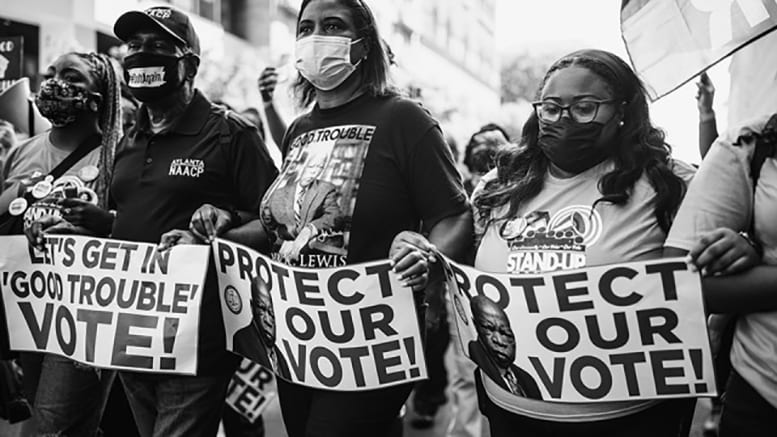On the occasion of Black History Month, Professors Sylvia Perry and Alvin Tillery reflect on multiracial democracy and talking to children about race
February 17, 2022

Black History Month not only recognizes past accomplishments but also offers a reflection on issues that need to be addressed in the future.
“Dr. Carter G. Woodson, the founder of Black History Month, envisioned that a focus on Black history would teach all Americans to ‘aspire to equality and justice’ for everyone in the U.S,” explains Alvin Tillery Jr., associate professor of political science and director of the Center for the Study of Diversity and Democracy at Northwestern University.
“This was so in Dr. Woodson’s reckoning because Black Americans had made enormous contributions to the development of American democracy, even when they themselves could not claim the benefits of full citizenship rights and participation in the nation’s institutions and economy. Dr. Woodson’s vision was in many ways an animating theme of the Civil Rights Movement of the 1950s and 1960s, as Black men and women who fought as young people to preserve democracy in Europe and Asia during World War II and the Korean War rallied to the calls of Fannie Lou Hamer, Dr. King, Daisy Bates, and A. Philip Randolph to demand changes in American society that would finally make them fully equal at home. ”
“No other goal was more important in this movement than securing the franchise rights that had been promised to them 90 years earlier with the passage of the 15th Amendment. What we have learned since the passage of the Voting Rights Act in 1965 is that all Americans have not embraced Dr. Woodson’s vision. On the contrary, instead of embracing the fact that the Voting Rights Act finally made America a full multi-racial democracy, many elites in the Republican Party and conservative movement have been working to undermine access to the ballot for minority communities since the day it passed.
“We must remember this fact as we ramp up efforts to preserve ballot access for African Americans and other people of color. When we reflect on how the Voting Rights Act was twice reauthorized with broad bipartisan support, we must remember that even during this time Republican-backed lawyers were working to undermine its effects through the judicial system. Indeed, when the Roberts Court struck down the Section 4(b) of the Voting Rights Act in 2013, it was the culmination of a 50-year legal campaign to undermine the law.
“This is a sobering reality that Black people are well aware of and are now organizing to combat. This point must be made over and over again to the allies of BIPOC communities as they wrestle with the question of what they can do to help preserve America’s multiracial democracy.”
“In our research we have found white parents choose to take a passive approach to conversations about race, simply waiting for their child to bring it up,” said Sylvia Perry, associate professor of psychology at Weinberg College of Arts and Sciences, a faculty fellow at the Institute for Policy Research and a faculty affiliate with the Institute for Sexual and Gender Minority Health and Wellbeing at Northwestern.
“Just because you haven’t heard your child say anything prejudiced does not mean that those attitudes are not forming. Children are not immune to the daily signals that they are observing in the world that indicate that some children are to be valued over others.
“If your child can have a conversation with you, they are old enough to start having conversations about race. As early as preschool, children start showing racial group favoritism.
“If children are exposed to prejudiced information through social media, their peers or the classroom, parents can counter that narrative by talking to their children about the history of and existence of racism within this country, the social construction of race, and the systemic biases that contribute to racial inequality.”
Read more about multiracial democracy, talking to children about race, and hear from additional experts in Northwestern Now’s article Teaching Americans ‘to aspire to equality and justice’ for everyone.

Society & Policy

Joel Mokyr wins Nobel Prize in Economic Sciences
October 13, 2025
Nobel recognizes Mokyr’s theory on sustained economic growth Joel Mokyr, the Robert H. Strotz Professor of Arts and Sciences and professor of economics and history in the Weinberg College of Arts and Sciences at Northwestern University, today (Oct….

Weinberg College faculty and graduate students recognized for excellence in teaching
July 2, 2025
Each year, the Weinberg College of Arts and Sciences and the Office of the Provost recognizes members of the College’s tenure-line and teaching-track faculty for excellence in teaching. Weinberg College in addition recognizes the contributions…

Passion for the planet: A new generation of environmental stewards starts here
May 29, 2025
Over the last two decades, the Weinberg College-housed Program in Environmental Policy and Culture (EPC) at Northwestern has embraced the humanities and social sciences and cultivated a new generation of environmental stewards. Growing up in…

The real beneficiaries of protective labor laws for women
May 20, 2025
During the first half of the 20th century, many states passed labor laws in response to the influx of women into the modern workplace. The so-called protective labor laws enacted by U.S. states restricted women’s…



